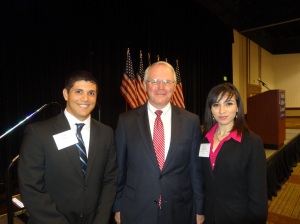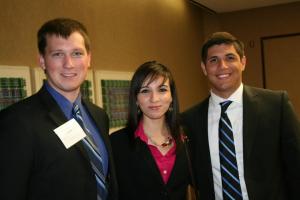The Junior Fellows were the beneficiaries of a virtual tour of the world last week, and they only had to travel seventy miles south of their campus. Their destination was a World Affairs Council event in Houston featuring Christopher Hill, the current Dean of the Josef Kurbel School of International Studies at the University of Denver and the former United States Ambassador to Iraq, Korea, Poland, and Macedonia. For a couple of hours over lunch, he also worked as an Ambassador for serving abroad, extolling the virtues of service, understanding, and working together.
One of Hill’s major themes was the importance of working in concert with others to achieve desired results. As a long-time ambassador, a special US envoy for the Bosnian peace talks in 1995, and as a member of the six-party talks formed to convince North Korea to end its nuclear weapon program, Hill knows about multi-lateral negotiations. “We’re not,” Hill said, “Gary Cooper in High Noon. We can’t do this alone.”
In dealing with North Korea, which he called a “little cuddly country that only a mother could love,” Hill stressed three things: (1) maintaining a strong alliance with South Korea, (2) continuing military exercises in South Korea, and (3) improving our missile defense system. While these three “keys” would help North Korea understand that the US commitment to the region is firm, he warned against escalating the situation, noting that North Korea’s unpredictable behavior made them “one of the great questions of our day.”
Central to resolving the North Korean situation—and, more generally, to a productive future in the Asian region—are relations between the US and China. While many envision an ineluctable conflict between the world’s remaining superpower and China, a burgeoning superpower, Hill is optimistic about relations. “There is no relationship that is more important,” the former ambassador noted, “than our relationship with China.” Although he acknowledges that a country as large as China has its own complexities and internal divisions, he argued that ongoing cooperation between the US and China is in the interests of both countries and, in the long-term, likely.
Hill also expressed some (cautious) optimism about the Middle East, noting improvements in Iraq’s economy, particularly in oil production. Having spent two years as Ambassador in Iraq, Hill emphasized that the country’s future direction could not be imposed externally. “Finger wagging in the Middle East gets you about as far as it does with your fourteen year-old daughter. Not very far.” The key, he noted, is for the Sunnis, who constitute a majority in most Middle-Eastern countries, to accept that the Shias are the demographic majority in Iraq. The government structure in Iraq, according to Hill, now “reflects reality” but the reality and the government structure will have to be recognized by a large majority of Iraqis for success to take root.
Ambassador Hill may not be known the world over in the same way that Hillary Clinton is, but he knows the world like few others, a product of being the son of a diplomat, experiencing a stint in the Peace Corps in Cameroon, and serving for more than three decades in the State Department. He drew on this experience in his closing remarks, which he directed to the students, stressing service, understanding, and bringing people together. “There is no greater honor,” he noted, “than representing your country abroad,” a service, he continued, that allows people to better understand their own country, “by understanding other countries.”

